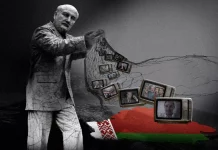
Topics of the Week
Read a detailed overview about the loan provided by the First Czech-Russian Bank to France’s far-right National Front and how it eventually became a thorn in the heel.
A former US Marine has been detained in Russia on spying charges, raising questions about motive for a possible exchange with convicted Russian national Maria Butina.
German political support for Nordstream II is showing signs of weaknessfollowing US pressure and Russian military aggression in the Sea of Azov.
he Kremlin’s current narrative: The emancipation of the Ukrainian Orthodox Church is a criminal act
Good Old Soviet Joke
In the US, you can always find a party.
In Soviet Russia, The Party can always find you!
Policy & Research News
Following Le Pen’s money
Back in 2014, France’s far-right National Front party – which is led by Marine Le Pen, who was a candidate in the most recent presidential elections – received a €9.4 million loan from the shady First Czech-Russian Bank. The Washington Post now describes how the loan was administered, the current state of its repayment, and the negative consequences facing the National Front.
“Four years later, the bank has gone bust. The owner is facing a warrant for his arrest. Former Russian military officers are demanding money. And the party’s treasurer is sending off some $165,000 every few months to a woman in Moscow, unsure of where the payments ultimately will go.”

The National Front turned to the First Czech-Russian bank after failing to obtain a loan from French banks, which were reluctant to lend money in the aftermath of Nicolas Sarkozy’s illegal campaign funding scandal, and likely also because the National Front had trouble repaying debts in the past (in one case, it even had to sell its headquarters).
But despite ultimately obtaining the loan, the National Front has had only limited political success. Instead, the shady source of the loan dragged the party “into the shadowy underworld of Russian cross-border finance, putting it in league with people accused of having ties to Russian organized crime, money laundering and military operations.”
Poland remains constantly on guard
In a report for The Washington Examiner, Stanisław Żaryn examines how Poland has been a constant target for Russian disinformation campaigns, even though the country has not received the same news coverage as that of Western countries like the Britain and the US. The pro-Kremlin campaign in Poland has included the creation of fake interviews, manipulation of photos, and dissemination of misleading articles.
The goal of the campaign, according to Żaryn, is to weaken support for NATO as well as Poland’s ties with the US. The campaign primarily targets decision-makers and the general public, simultaneously portraying NATO as aggressive and unreliable.
Facebook’s biggest fake news stories
In 2018, Facebook repeatedly promised to crack down on fake news stories, following increasing scandals and backlash about the platform’s role in enabling disinformation. However, Buzzfeed has found only a minimal decrease in engagement with fake stories on the platform: just 7 percent. The annual report looks at the top 50 new articles that were reported as false by fact checkers; in 2018, these 50 stories generated 22 million comments, shares, and reactions. Although Facebook did improve its take-down policy, blocking domains that had been flagged by fact checkers, this measure simply changed the behaviour of the sites and incited domain-hopping to avoid detection.
One big change to Facebook’s policy in 2018 was to allow satire articles to be rated as false, meaning that they would have reduced visibility on users’ newsfeeds. Previously, many news sites avoided flagging simply by including a disclaimer on their site that their content was satirical.
Facebook has reported that the total amount of fake content has been declining on the platform, though the degree to which this is the case is not yet clear. The trend may be influenced by sites looking to other platforms to spread their content. Even so, Facebook still remains the best place for fake content to go viral.
Young men targeted through gaming community
While most of the research on online disinformation focuses on the big social media platforms like Facebook and Twitter, two Canadian journalists have looked farther, specifically into the gaming community called Discord. Smaller social media platforms are harder to research but are often a breeding ground for conspiracy theories and radicalization. The private encrypted group chats of Discord are prone to becoming echo-chambers, and the journalists found extreme amounts of anti-Semitic and sexist discussion, including connections to the Atomwaffen Division and celebration of far-right terrorism. Their report even resulted in the issue of an arrest warrant, underscoring the importance of extending research to less mainstream online communities.
US Developments
Former US Marine detained in Russia on spying charges
Russia’s FSB has charged former US Marine Paul Whelan with espionage after detaining him in Moscow, on grounds that he was allegedly attempting to obtain a flash-card from a Russian citizen in a Moscow hotel. The flash-card supposedly contained sensitive data regarding Russian security. The FSB took Whelan into custody on Dec. 28 but have so far not provided further information about his alleged activities. Whelan’s family has said that he was in Moscow to attend a friend’s wedding and is innocent of the espionage charges.
US officials have demanded an explanation for Whelan’s detention. Secretary of State Mike Pompeo has said that the US will request his “immediate return” if a domestic investigation determines that the detention is unfounded. Notably, the timing of Whelan’s arrest coincides with the conviction of Russian national and gun rights activist Maria Butina, who recently pled guilty to Kremlin interference in a US court. Whelan’s detention now raises questions about a potential swap. Daniel Hoffman, a former CIA Moscow station chief, suggested that it is “possible, even likely” that Vladimir Putin had ordered Whelan’s arrest to set up an exchange for Butina.
Indeed, Whelan’s arrest is reminiscent of a similar incident in 1986, when the KGB arrested a US journalist, Nicholas Daniloff, for espionage and locked him in the same prison as Whelan currently sits. Notably, Daniloff’s detention came days after the US arrested a Soviet aide, Gennady Zakharov, for gathering classified data at the UN in New York. The Reagan administration subsequently negotiated Daniloff’s release in exchange for Zakharov’s. “It looks like the Russians are trying to set up a one-on-one exchange, Whelan for Butina in Washington,” says Daniloff, “and to tell you the truth, I’m surprised that they didn’t arrest an American sooner than they did.”
US pressure over Nordstream II begins to sting
According to senior lawmakers in Germany, support is waning for the Nordstream II pipeline among German politicians who previously supported the $11 billion project and defended it against criticism from some EU allies and Donald Trump. Nils Schmid of the SPD, which has been a staunch proponent of Nordstream II, recently conceded that too many German policy-makers had been slow to recognize the pipeline’s geopolitical significance in terms of its anticipated impact on Ukraine and eastern Europe, saying that “it would have been better to take this political dimension into account.” Schmid, who is known as the SPD’s foreign policy maven, added that Nordstream II shouldn’t be allowed proceed until Russia and Ukraine reach a transit accord.
In what may seem surprising given his known affections for Russia and Vladimir Putin, US President Donald Trump has been sharply critical of Nordstream II, claiming that it will hold Germany ‘captive’ to Russia. The US administration has threatened sanctionsagainst companies involved in the construction of Nordstream II, which now may beimminent. It is unclear to what degree the shift in mood is a response to US pressure or growing concern in Berlin about Russia’s intentions in the aftermath of the Kerch Strait incident. But Richard Grennell, the US ambassador to Germany, has welcomed Berlin’s newfound skepticism about the project, emphasizing that it undermines the EU’s energy and security objectives. “There is not only Russian gas coming through the pipeline, but also Russian influence,” Grenell said. “Now is not the time to reward Moscow.”
Trump echoes Kremlin narrative about Afghanistan
Donald Trump rang in the new year with yet another astonishing display of ignorance, this time betraying his atrocious grasp of Cold War history while spouting pro-Kremlin talking points. When asked about whether he would follow the US withdrawal from Syria with a similar exit from Afghanistan, Trump referred to the Soviet experience of the 1980s, getting it about as wrong as possible. “The reason Russia was in Afghanistan was because terrorists were going into Russia,” Trump declared. And then he actually endorsed the Soviet invasion: “They were right to be there.”
In fact, there were no terrorists and no threat to the Soviet Union. Instead, the USSR invaded Afghanistan to protect its ally – a nominally communist, pro-Soviet client state in Kabul that was facing public opposition. The Kremlin of 1979 was worried about losing another member from its sphere of influence, and to this end, suppressed popular resistance to its installed regime by killing hundreds of thousands of Afghani civilians. By its end in 1989, the Soviet war had cost 2 million Afghan lives.
As David Frum writes in The Atlantic, “Putin-style glorification of the Soviet regime is entering the mind of the president, inspiring his words and – who knows – perhaps shaping his actions. How that propaganda is reaching him – by which channels, via which persons – seems an important if not urgent question.”
The Kremlin’s Current Narrative
Ukrainian Orthodox Freedom – A Crime in Kremlin Eyes
On January 5th, Ecumenical Orthodox Patriarch Bartholomew signed a decree officially granting the Ukrainian Orthodox Church autocephalous status and independence from any ties to its Russian counterpart. However, what was meant as cause for celebration naturally turned into an opportunity for Russian media outlets to play the propaganda card and lambast a grand event as a strategic conspiracy against Russia. Indeed, the event was criticized as a move that would not only hamper Ukraine-Russia relations, but also set the stage for the alleged persecution of Ukrainian citizens loyal to the Russian Orthodox Church. Russian media outlets already have, before anyone else, begun publishing reports that the Ukrainian Rada is preparing to pass legislation that would allegedly confiscate ecclesiastical properties associated with the Russian Church.
Needless to say, Russian media outlets are working diligently to warp the perception of truth. A genuinely independent Orthodox Church in Ukraine has been a project in development for decades and its completion signals the nation’s further aspirations towards EU and NATO integration, as well as overall democratic development. In addition, the Ukrainian Church would now be free to conduct matters without the requisite approval of an Orthodox Church infiltrated by the Kremlin. Yet, in the eyes of the Kremlin, such a move only undermines Russia’s geopolitical dominance over Ukraine’s domestic affairs. At the same time, it is easy to see how the Kremlin projects itself as the victim strictly to cultivate a whitewashed international image whenever an appropriate opportunity arrives. Both the Kremlin Russian Orthodox Church understand that they are losing the overall battle; thus, their efforts at disinformation are expected to rise exponentially.
Kremlin Watch Reading Suggestion
Russian Influence Operations on Twitter
Last October, Twitter published over 9 million tweets from accounts affiliated with the Russian Internet Research Agency. DEMOS recently analysed a subset of this dataset which includes UK-related tweets, replies, and mentions (detected via geolocation), and keywords (e.g., Brexit, UK General Elections). Twitter activity was measured over time from April 2011 to April 2018.
Researchers were able to determine 3 phases of activity growth. Firstly, between May and August 2015, English-language tweets increased dramatically. The tweets were mainly spam and contained fitness and exercise-related content. Researchers believe this activity was used to build up account authenticity and gain legitimate followers in an attempt to slowly infiltrate the conversation with fake accounts. On the day of Brexit, there was another phase of high activity mostly concerning the referendum and various related news. Notably, the accounts in the dataset were not vocal about Brexit in the 6 months prior to the referendum results but instead focused on Islam in the UK.
The next phase of activity coincided with the London and Manchester terror attacks. Tweets contained an overwhelming focus on Islam in the UK, which influenced and increased the volume of Islam-related conversations in the wake of the terror attacks. Researchers suggest that their focus of the UK may have been a minor part of extensive Russian influence operations against the US.

Kremlin Watch is a strategic program of the European Values Think-Tank, which aims to expose and confront instruments of Russian influence and disinformation operations focused against liberal-democratic system.




